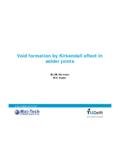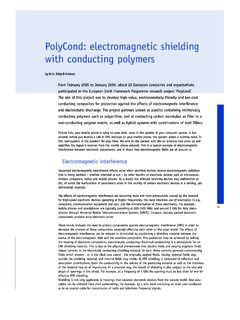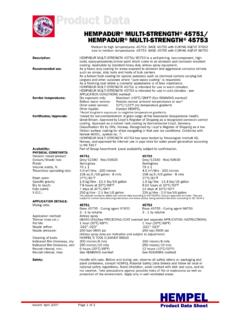Transcription of Offshore wind foundations - Materialenkennis
1 Offshore wind foundations Long term corrosion protection,.. fiction? November 2015, Jo van Montfort Main Topics General introduction Current situation Offshore wind Differences with O&G Background Coatings Standards State of the art and current needs Proposed new approach Conclusions Current situation Global impact Estimated at US$ trillion, the annual global cost of corrosion is over 3% of the world s GDP Challenges WCO: All studies estimate that 25 to 30% of annual corrosion costs could be saved if optimum corrosion management practices were employed Implement knowledge into practice! Fact You can never kill it, you can only fight/manage it! Offshore wind foundations Classification environment Relevant types of corrosion Type Atmospheric Galvanic Crevice and pitting ALWC (MIC) Stress corrosion cracking HIC Corrosion rate/y in sea water 0,1 1 mm 1-3 mm 1-3 mm 1-3 mm ALWC SRB heavy fouling biomat scare e- e- patchy distribution of biomats and scars creates anode MIC - differential aeration - open circuit potential (noble shift to + 400mV) - increasing cathode reaction rate (exceeding pitting potential) Johan Mertens Offshore wind farms Corrosion challenge Corrosion is a top three failure mechanism, due to atmospheric, marine and bio-corrosion.
2 Extremely high repair costs (up to 3000/m2), due to Offshore circumstances Different from O&G; complex dynamical loads, mass production, maintenance free approach Splash zone Monopile / transition piece Monopile internal Secondary structures Offshore wind farms System challenge Minimal part of budget allocated to maintenance, resulting in extreme OPEX overspending Mass produced substructures require quick curing systems Current procurement focus is NOT on complete lifetime of an asset Current standards and guidelines focus on lifetimes < 15 years Trend is working towards further Offshore and deeper installations, resulting in even higher repair costs Facts Typical corrosion damage on foundations : splash zone, internal monopile, secondary structures (boat landing, J-tubes, railings, platforms, stairs).
3 Different from O&G Cost aspect Offshore wind initial phase versus O&G focus on the complete lifetime of asset. Large Offshore wind farms (500 MW and more) means mass production resulting in high pressure on the fabrication (limited curing time of coating systems), O&G uses single structures specific designed and more time for curing and fabrication is usually calculated in the fabrication process. The operational phase in Offshore wind is based on minimal maintenance or even maintenance free for the sub structure, O&G has depending on the individual standard practises more actions and budget reserved for maintenance Offshore . Offshore wind applies strictly the general specifications, in O&G the owner usually applies specific standard practises in which an additional safety factor is calculated such as an additional coating layer in the splash zone or prevention of bio-corrosion in confined spaces.
4 State of the art not sufficient State of the art guidelines DNV-OS-J101: Design of Offshore wind Turbine Structures The DNV-OS-J101standard provides principles, technical requirements and guidance for design, construction and in-service inspection of Offshore wind turbine foundation structures. Corrosion protection is mentioned, but the document refers to other standards and recommended practices, like NOROSK M-501, ISO 12944 and DNV-RP-B401. NORSOK M-501: Surface preparation and protective Coating NORSOK M-501 is specifically developed for the Offshore oil and gas industry. A pre-qualification regime for coatings in atmospheric-, splash- and submerged zone may be applicable to Offshore wind as well, but due to differences with respect to maintainability and access to surfaces, copying NORSOK M-501 uncritically may be a dangerous strategy for the Offshore wind industry.
5 ISO 12944: Paints and varnishes - Corrosion protection of steel structures by protective paint systems ISO 12944 describes selection of protective coatings for steel constructions in all environments. Lifetimes are estimated in three groups: low < 5 years, medium 5-15 years and long > 15 years. For constructions with lifetimes longer than 20 years one can discuss whether this standard is helpful. DNV-RP-B401: Cathodic Protection Design DNV-RP-B-401 describes design of cathodic protection of marine constructions. State of the art not sufficient Current situation Selecting Coatings ISO 12944-6 Preferably experience (similar cases) Artificial test result used with caution Required Tests C5-M and C4 Water condensation (ISO 6270) Neutral salt spray (ISO 7253) On flat panels New materials Applied under lab.
6 Conditions Although it is in the ISO do not do this. We need materials fit for purpose passing lab. Tests! Insufficient Bad correlation Testing Coating systems (off shore, bridges, etc. ) C5-M and C4 State of the art not sufficient Guideline for the Certification of Offshore wind Turbines, GL wind 2005 Offshore wind turbine components are exposed to aggressive environmental conditions and not easily accessible. Because of the operational conditions, in many cases repeated protective coating is not possible. Special importance therefore attaches to the design, choice of material and corrosion protection measures . - Germanischer Lloyd WindEnergie Coatings, PAIN(t)? Main Function Shield steel (metal) from environment during > 20 years? How? Prepare surface ( if you fail to prepare you prepare ) Mix wet (2) components Apply wet components on substrate Multi layers Current solutions Current solutions Multi layer systems >8-24h waiting between layers Passing tests but lack of proven track records Strict application circumstances required: Maximum surface prep.
7 Required Expensive and long term shielding T and/or RH control Maximum 15 years lifetime Containing VOC s (10-30%) Not under water (influences) curable Offshore wind farms Current Coating systems Coatings, PAIN(t)? What happens? Mulitlayers (3-4) Chemical reaction simultaniuous release of solvents, induce: Internal stress ( coss linking ) Internal voids/defects ( holidays ) What is (not) controlled? Temperature and RH (dew point) Thickness Adhesion (to steel and intercoat) Currently accepted Risks Parameter Preparation Temperature, RH Thickness Waiting in between Water (rain, moist) Effect Adhesion Adhesion, curing, solvent retention Insufficient cover, vs high internal stress Solvent retention vs bad intercoat adh. Insufficient curing Crack formation Displacement On welded edge Stress Displacement Examples Cause of Multi million damages Main cause of paint material failure = early (micro) cracking of the paint Main cause of paint system failure = low tolerance to application window (surface prep.)
8 , T / RH) Corrosion = Result of 50% coating material and 50% system failure Main root cause Problem is Unawareness of Incompetence Product Designed for passing tests Insufficient verifiable, relevant track records Purchase on liter price (not performance) Application Strict application circumstances required Multi layers VOC s (10-30%) Unpredictable performance and (maybe) unforeseen early damage Result =illusion reducing risks Offshore wind farms NEEDS Lower initial costs and lower Life Cycle Cost Workability under poor conditions Low environmental impact (0% VOCs, no leaching) Broad application window (T / RH) Rapid application (exposing wet paint to water) Maintenance free (25+ years) Easy repair (over coat-able) under Offshore conditions Insurance on full package PPP Offshore wind farms NEEDS Current approach If you fail to prepare, you prepare Passing lab.
9 Tests= Demonstrate performance On flat panels Aplied under perfect conditions New material in Cor-test Ageing test related to aesthetics Materials properties not known Limited data review on track records Product (liter/kg) Price New approach Demonstrate tolerance for application circumstances by: Testing not only on perfect substrates under perfect circumstances. Accept that a perfect substrate is a myth but a more tolerant coating materials are needed. Data from Track records proves real performance outdoor (EIS) Understanding materials behavior will reduce risks and costs (modelling) Saving LCC Fit for purpose tests, EIS Offshore wind farms NEEDS Competition Grooved panels versus flat Mechanical properties krimp0 uur500 uur1000 uur1500 uurkrimp0 uur 500 uur 1000 uur 1500 uur relaxatie relaxatie treksterkte0 uur500 uur1000 uur1500 uur before WOM After WOM Glas transition temperature 31 C 57 C Adhesion strngth 7,4 Mpa 9,6 Mpa Problem definition Defects in the existing coating resulting in corrosion affecting structural integrity in due time.
10 Repairs with existing coating systems are nearly impossible or extremely costly because of the Offshore circumstances Solution Application of a single layer system which is tolerant for Offshore circumstances because of: High tolerance against insufficient surface preparation High tolerance against water immediately after application. 10 years warranty. Benefits Fast and cost effective durable solution. Example Conclusions Be critical and reluctant about conventional tests Propose together with expert fit for purpose testing Coatings really do have mechanical properties Most valuable test is (validated) outdoor experience Assess TOLERANCE of coating Product Price is irrelevant, assess project price Innovation is not always new Cost savings (initial and LCC) of more than 20% are possible (Acotec) Questions?







